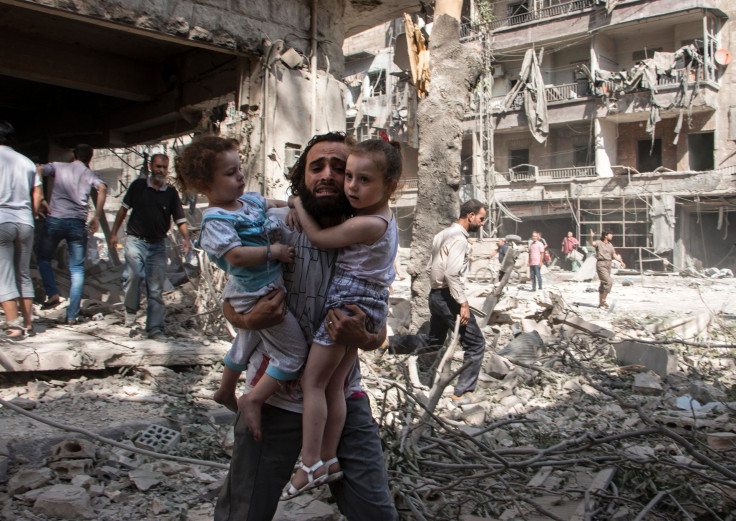Syria Conflict: Aleppo Airstrikes Kill Over 338 People, Including 100 Kids, WHO Says

The World Health Organization (WHO) said Friday that the continuous airstrikes in Syria’s Aleppo city in the past week claimed the lives of nearly 338 people, including over 100 children. The country’s health system is crumbling with less than 30 doctors tending to hundreds of thousands of people in only six partially functioning hospitals.
The WHO called for the immediate and safe evacuation of all the injured from the war-torn country, including the besieged Aleppo area.
“The situation is heart-rending and enraging,” WHO Director-General Margaret Chan said in a statement. “With the relentless attacks on health workers and hospitals, the handful of doctors still alive cannot possibly cope. Hospital beds are too few, equipment has been destroyed, and essential medicines, including anesthetics, are running out. Many patients needing emergency trauma care are children. ”
The international public health organization said that over 270,000 people are trapped in Aleppo with meager food supplies, water and aid. The repeated attacks have left over 840 people injured in just the past week. One third of those injured are children, the statement said. Forces have targeted aid workers and hospitals in the attack further hindering the delivery of humanitarian aid.
“Attacking health care is both illegal and barbaric,” Pete Salama, executive director of WHO’s health emergencies program, said in the statement. “Blocking whole populations from access to medical care, food and water is intolerable. It is inexcusable cruelty.”
The organization said workers have positioned medical supplies for delivery into battered eastern Aleppo but they have been barred from entering the city.

Friday also marked one year since Russian airstrikes began in Syria. Britain-based monitor Syrian Observatory for Human Rights said that in the one year, over 9,000 people were killed and tens and thousands displaced. The monitor said the figure includes nearly 3,800 civilians and 5,500 fighters from the Islamic State group and several rebel groups.
Russia rejected the figure, saying that it finds the information unreliable. “We do not consider information about what happens in Syria from an organization based in Britain to be reliable,” Kremlin spokesman Dmitry Peskov reportedly said.
Meanwhile, a Russian newspaper reported that the country will send more warplanes to Syria to escalate its airstrikes. This move comes at a time when Russia is on the receiving end of criticism from world leaders and the United Nations for targeting civilians, aid workers and hospitals. UN Secretary-General Ban Ki-moon said Wednesday that such attacks were “war crimes.”
Moscow and Damascus have, however, denied these accusations saying that their jets only targeted militants. The U.S. has warned Russia that it would suspend cooperation if Russia did not halt its offensive in Aleppo.
“What has happened now, with the hitting of the humanitarian convoy and with the subsequent siege on Aleppo, you’ve got a scenario now, a dynamic where, as these moderate opposition forces are under increasing pressure from the regime, that they are driven into the arms [militants], and they have to fight side by side,” US state department spokesman Mark Toner said. “It escalates, and makes more confusing, what is already a difficult situation.”
Russian Foreign Minister Sergei Lavrov accused the U.S. of failing to separate the Jabhat Fateh al-Sham (previously known as al-Nusra) and other terrorist groups from moderate rebel groups.
In an interview with the BBC, Lavrov said, “They [the U.S.] pledged solemnly to take as a priority an obligation to separate the opposition from Nusra.”
“They still, in spite of many repeated promises and commitments... are not able or not willing to do this and we have more and more reasons to believe that from the very beginning the plan was to spare Nusra and to keep it just in case for Plan B or stage two when it would be time to change the regime,” he added.
© Copyright IBTimes 2024. All rights reserved.












